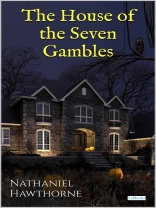The House of the Seven Gables by Nathaniel Hawthorne is a Gothic novel that explores themes of guilt, hereditary sin, and the passage of time. Set in a decaying New England mansion, the story follows the Pyncheon family, whose past is marked by a dark curse linked to ancestral greed and injustice. As the present generations struggle with the weight of their history, Hawthorne weaves a tale of mystery, redemption, and the inevitable influence of the past on the present.
Since its publication, The House of the Seven Gables has been praised for its richly atmospheric storytelling and psychological depth. The novel blends supernatural elements with social critique, examining the effects of inherited guilt and the moral consequences of ambition. Hawthorne’s intricate prose and symbolic imagery make it a cornerstone of American Gothic literature.
The novel’s enduring relevance lies in its exploration of human nature, the burdens of history, and the potential for renewal. The House of the Seven Gables remains a haunting reflection on the inescapability of the past and the hope that lies in personal transformation and redemption.
O autorze
Nathaniel Hawthorne was an American writer known for his exploration of moral complexity, guilt, and the impact of Puritanism on individual lives. Born in Salem, Massachusetts, Hawthorne is widely recognized as one of the most significant figures in American literature. His works often deal with themes of sin, redemption, and the conflict between individual desires and societal expectations.
Hawthorne’s literary career began with short stories, later compiled in Twice-Told Tales (1837). However, his greatest impact came with his novels, particularly The Scarlet Letter (1850), which explores the consequences of sin and social judgment in Puritan New England. The novel’s protagonist, Hester Prynne, embodies themes of resilience and moral ambiguity, making it a landmark in American literature.
Hawthorne’s influence extends beyond literature, shaping the development of American fiction and inspiring writers such as Herman Melville and Henry James. His ability to weave historical context with deep psychological insight made him a pioneer of dark romanticism, a movement that explored human fallibility and the supernatural.
His themes of guilt, hypocrisy, and the burdens of the past resonate in contemporary discussions about morality and identity. His works continue to be widely studied, reflecting the enduring power of his storytelling.












